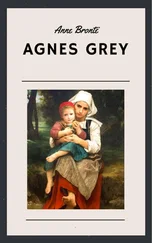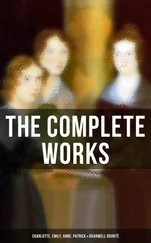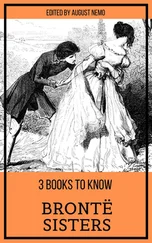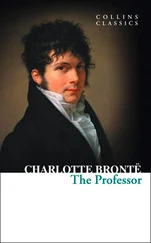Some time before Mr. Huntingdon's death Lady Lowborough eloped with another gallant to the Continent, where, having lived a while in reckless gaiety and dissipation, they quarrelled and parted. She went dashing on for a season, but years came and money went: she sunk, at length, in difficulty and debt, disgrace and misery; and died at last, as I have heard, in penury, neglect, and utter wretchedness. But this might be only a report: she may be living yet for anything I or any of her relatives or former acquaintances can tell; for they have all lost sight of her long years ago, and would as thoroughly forget her if they could. Her husband, however, upon this second misdemeanour, immediately sought and obtained a divorce, and, not long after, married again. It was well he did, for Lord Lowborough, morose and moody as he seemed, was not the man for a bachelor's life. No public interests, no ambitious projects, or active pursuits, - or ties of friendship even (if he had had any friends), could compensate to him for the absence of domestic comforts and endearments. He had a son and a nominal daughter, it is true, but they too painfully reminded him of their mother, and the unfortunate little Annabella was a source of perpetual bitterness to his soul. He had obliged himself to treat her with paternal kindness: he had forced himself not to hate her, and even, perhaps, to feel some degree of kindly regard for her, at last, in return for her artless and unsuspecting attachment to himself; but the bitterness of his self-condemnation for his inward feelings towards that innocent being, his constant struggles to subdue the evil promptings of his nature (for it was not a generous one), though partly guessed at by those who knew him, could be known to God and his own heart alone; - so also was the hardness of his conflicts with the temptation to return to the vice of his youth, and seek oblivion for past calamities, and deadness to the present misery of a blighted heart a joyless, friendless life, and a morbidly disconsolate mind, by yielding again to that insidious foe to health, and sense, and virtue, which had so deplorably enslaved and degraded him before.
The second object of his choice was widely different from the first. Some wondered at his taste; some even ridiculed it - but in this their folly was more apparent than his. The lady was about his own age - i.e. between thirty and forty - remarkable neither for beauty, nor wealth, nor brilliant accomplishments; nor any other thing that I ever heard of, except genuine good sense, unswerving integrity, active piety, warm-hearted benevolence, and a fund of cheerful spirits. These qualities, however, as you way readily imagine, combined to render her an excellent mother to the children, and an invaluable wife to his lordship. He, with his usual self-depreciation (or appreciation?) thought her a world too good for him, and while he wondered at the kindness of Providence in conferring such a gift upon him, and even at her taste in preferring him to other men, he did his best to reciprocate the good she did him, and so far succeeded that she was, and I believe still is, one of the happiest and fondest wives in England; and all who question the good taste of either partner may be thankful if their respective selections afford them half the genuine satisfaction in the end, or repay their preference with affection half as lasting and sincere.
If you are at all interested in the fate of that low scoundrel, Grimsby, I can only tell you that he went from bad to worse, sinking from bathos to bathos of vice and villainy, consorting only with the worst members of his club and the lowest dregs of society - happily for the rest of the world - and at last met his end in a drunken brawl, from the hands, it is said, of some brother scoundrel he had cheated at play.
As for Mr. Hattersley, he had never wholly forgotten his resolution to 'come out from among them,' and behave like a man and a Christian, and the last illness and death of his once jolly friend Huntingdon so deeply and seriously impressed him with the evil of their former practices, that he never needed another lesson of the kind. Avoiding the temptations of the town, he continued to pass his life in the country, immersed in the usual pursuits of a hearty, active, country gentleman; his occupations being those of farming, and breeding horses and cattle, diversified with a little hunting and shooting, and enlivened by the occasional companionship of his friends (better friends than those of his youth), and the society of his happy little wife (now cheerful and confiding as heart could wish), and his fine family of stalwart sons and blooming daughters. His father, the banker, having died some years ago and left him all his riches, he has now full scope for the exercise of his prevailing tastes, and I need not tell you that Ralph Hattersley, Esqr., is celebrated throughout the country for his noble breed of horses.
Chapter 51,
An Unexpected Occurrence
We will now turn to a certain still, cold, cloudy afternoon about the commencement of December, when the first fall of snow lay thinly scattered over the blighted fields and frozen roads, or stored more thickly in the hollows of the deep cart-ruts and footsteps of men and horses impressed in the now petrified mire of last month's drenching rains. I remember it well, for I was walking home from the vicarage with no less remarkable a personage than Miss Eliza Millward by my side. I had been to call upon her father, - a sacrifice to civility undertaken entirely to please my mother, not myself, for I hated to go near the house; not merely on account of my antipathy to the once so bewitching Eliza, but because I had not half forgiven the old gentleman himself for his ill opinion of Mrs. Huntingdon; for though now constrained to acknowledge himself mistaken in his former judgment, he still maintained that she had done wrong to leave her husband; it was a violation of her sacred duties as a wife, and a tempting of Providence by laying herself open to temptation; and nothing short of bodily ill-usage (and that of no trifling nature) could excuse such a step - nor even that, for in such a case she ought to appeal to the laws for protection. But it was not of him I intended to speak; it was of his daughter Eliza. Just as I was taking leave of the vicar, she entered the room, ready equipped for a walk.
'I was just coming to see, your sister, Mr. Markham,' said she; 'and so, if you have no objection, I'll accompany you home. I like company when I'm walking out - don't you?'
'Yes, when it's agreeable.'
'That of course,' rejoined the young lady, smiling archly.
So we proceeded together.
'Shall I find Rose at home, do you think?' said she, as we closed the garden gate, and set our faces towards Linden-Car.
'I believe so.'
'I trust I shall, for I've a little bit of news for her - if you haven't forestalled me.'
'I?'
'Yes: do you know what Mr. Lawrence is gone for?' She looked up anxiously for my reply.
'Is he gone?' said I; and her face brightened.
'Ah! then he hasn't told you about his sister?'
'What of her?' I demanded in terror, lest some evil should have befallen her.
'Oh, Mr. Markham, how you blush!' cried she, with a tormenting laugh. 'Ha, ha, you have not forgotten her yet. But you had better be quick about it, I can tell you, for - alas, alas! - she's going to be married next Thursday!'
'No, Miss Eliza, that's false.'
'Do you charge me with a falsehood, sir?'
'You are misinformed.'
'Am I? Do you know better, then?'
'I think I do.'
'What makes you look so pale then?' said she, smiling with delight at my emotion. 'Is it anger at poor me for telling such a fib? Well, I only "tell the tale as 'twas told to me:" I don't vouch for the truth of it; but at the same time, I don't see what reason Sarah should have for deceiving me, or her informant for deceiving her; and that was what she told me the footman told her:- that Mrs. Huntingdon was going to be married on Thursday, and Mr. Lawrence was gone to the wedding. She did tell me the name of the gentleman, but I've forgotten that. Perhaps you can assist me to remember it. Is there not some one that lives near - or frequently visits the neighbourhood, that has long been attached to her? - a Mr - oh, dear! Mr - '
Читать дальше
Конец ознакомительного отрывка
Купить книгу










